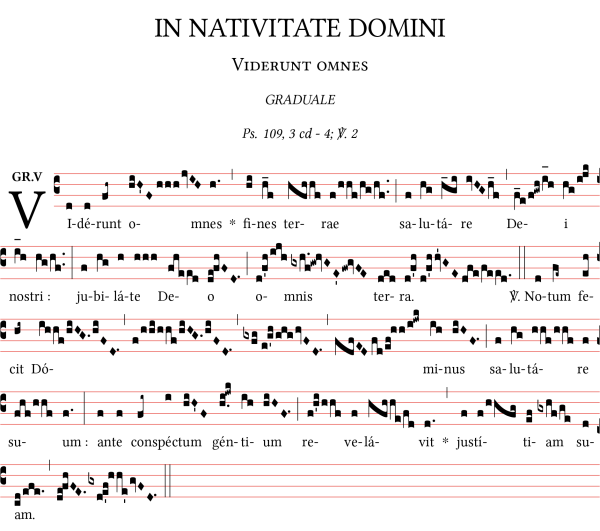Viderunt omnes (Graduale)
Il brano Viderunt omnes (noto anche come Viderunt omnes fines terrae) è il canto Graduale per la Messa del giorno di Natale. Ne riportiamo la versione presente nel Graduale Romanum (1974) a pag. 48.
Indice
Testo e traduzioni
Viderunt omnes fines terrae salutare Dei nostri. Notum fecit Dominus salutare suum: |
Tutti i confini della terra hanno veduto la salvezza del nostro Dio. Il Signore ha manifestato la sua salvezza, |
All the ends of the earth have seen the salvation of our God. The Lord has made his salvation known |
Spartiti musicali
Spartito gregoriano, impaginato su foglio formato A4:
Spartito disponibile in formato PDF impaginato su foglio A4, Media:Viderunt-omnes-graduale.pdf
Video
Versione tratta dal Graduale Romanum 1961, pag. 409, canale YouTube Stephan George.
Codice sorgente GABC
name:Viderunt omnes; office-part:Graduale; mode:5; book:Graduale Romanum, 1961, p. 33 & The Liber Usualis, 1961, p. 409 & Graduale Romanum, 1974, p. 48 & Gregorian Missal, 1990, p. 199; transcriber:Andrew Hinkley; %% (c3) VI(d)dé(d)runt(fh~) o(hiH'F//hhhjvIH)mnes(h.) *(,) fi(hi)nes(h_f) ter(hfhhf)rae(f/hhf/hg/hf..) (;) sa(f)lu(hg)tá(h_gi)re(ivHGh_f) (,) De(f_e/f!gwh/i_[oh:h]h)i(hg/ijk) no(i_[oh:h]h)stri :(hg/hf..) (:) ju(f)bi(hg)lá(h)te(hhh) De(fhee[ll:1]d)o(de!fhFD.1) (;) o(d!f'h/ijh)mnis(gxh.f!gw!hvGE'fw!gvFE) ter(ded)ra.(d!f'h//d!f'hhv'1GE//dfe/fee[ll:1]d.0) (::) <sp>V/</sp>. No(d)tum(fe~) fe(eh)cit(hi~) Dó(ihhf/hiHG.hiFD.1)(,)(f/hhi/hhf/hiHG.hiFD.1)(,)(gxfg//e!g'h/ghghvFD.1)(,)(fdfED//fd/ef!hh/i!jwk)mi(ih)nus(hiHF.1) (;) sa(f)lu(hg)tá(hhf/hhf)re(f) su(fhf/hhf)um :(f.) (:) an(f)te(f) con(fi~)spé(i)ctum(hiH'F) gén(h.i!jwk)ti(ih)um(hiHF.1) (;) re(f!h'i/hhf)ve(f)lá(hfhhe/fd)vit(d.) *(,) ju(f)stí(f/hhfg)ti(ef)am(gxhf/ge) su(d)am.(cd/efe.) (,) (de!fhFE.gxde'f!hhe'gvFD.1) (::)
Bibliografia
- GregoBase project, https://gregobase.selapa.net/
- Graduale Romanum, Libreria Editrice Vaticana 1974, pagina 48.
